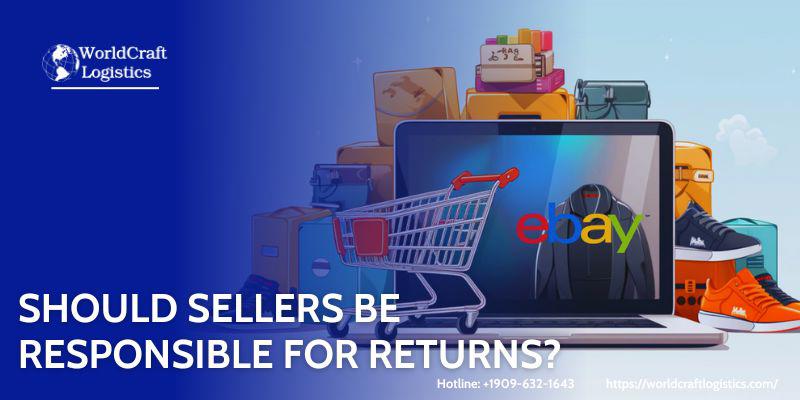
Starting June 1st, 2023 Our warehouse fee will be $0.65/cubic foot per month
In effort to lower the warehouse storage fee during inflation, we have went narrow aisle racking.This construction took us four months but the project is finally completed. With narrow aisle racking, we are able to drop storage by 24%.We as partners will go through this inflation together.
09/19/2024
In recent years, eBay sellers have increasingly found themselves in a difficult situation. While they fulfill their responsibilities by shipping products to US-based addresses, they are sometimes confronted with customer complaints that originate from international buyers. These customers often use freight forwarders, a service that accepts shipments at a US address and then forwards the package to its final overseas destination. The issue arises when buyers, after receiving their items internationally, file claims for "not received" or "not as described" products, leaving sellers in a challenging position.

Freight forwarders provide a service where packages are delivered to a US hub, aggregated with other shipments, and then forwarded to international locations. For many buyers, this offers the benefit of reduced shipping costs. However, sellers are often left in the dark about what happens to their products once they leave US soil.
A recent episode of the eBay for Business podcast highlighted this issue, as a seller named Chrissy reached out with a concern. Chrissy had shipped a package to a Delaware address, only to receive a message weeks later from a buyer in China stating that the item had arrived damaged. Understandably, Chrissy was concerned about whether she would be held responsible for the return, given that the damage may have occurred after the package left her hands.
Our other articles:
👉 Amazon & Accenture: Reducing Shipment Emissions
👉 OnTrac announces the growth of the Midwest delivery network
👉 Kuehne+Nagel moves into new cargo facility at Birmingham airport

In the podcast, hosts Kayomi Kayoshi and Jim "Griff" Griffith tackled Chrissy’s dilemma. Griffith explained that while a buyer could theoretically file a return request, eBay’s system would use the freight forwarder’s US address as the point of origin. This means it would be logistically impossible for the buyer to print a return label from China that would work with eBay’s system.
More importantly, Griffith emphasized that sellers are "off the hook" for return requests or claims from international buyers who use freight forwarders. eBay does not automatically accept return requests in these cases, and sellers should not be responsible for paying the return shipping costs from international locations.
This isn’t the first time sellers have raised concerns about freight forwarders. In a previous episode of the eBay for Business podcast, Kayoshi pointed out that eBay charges an international fee in situations where a buyer’s registered address is outside the US, even if the item is shipped to a US freight forwarder. This fee can catch sellers off guard, particularly when they have no control over where the item ultimately ends up.
What makes the situation more complicated is that eBay currently does not provide sellers with a way to block buyers who use freight forwarders. This has sparked frustration among some sellers, who feel that they are being exposed to unnecessary risk without adequate safeguards.

The debate over whether eBay should disallow the use of freight forwarders remains unresolved. In the podcast, Kayoshi asked Griffith whether he believed eBay should take steps to restrict these services. Griffith acknowledged the concerns but suggested that eBay is likely to continue allowing freight forwarders and address problems on a case-by-case basis.
Freight forwarders provide international buyers with a convenient and cost-effective way to access goods from US-based sellers. However, the system leaves sellers vulnerable to claims and return requests that are difficult to resolve. Many sellers feel they lack control over how their products are handled once they leave the US, which can lead to damaged goods or delayed deliveries.
Sellers have voiced their concerns across various forums, questioning whether eBay’s current policies adequately protect them from the risks associated with freight forwarders. While the platform provides some protections, such as not auto-accepting returns in cases involving forwarders, the lack of transparency regarding how goods are handled during international shipping remains a significant pain point.
A common sentiment among sellers is that eBay should either offer more robust protections or provide an option to block buyers who use freight forwarding services. The ability to avoid transactions involving forwarders would allow sellers to maintain greater control over their shipments and reduce the risk of fraudulent claims.
The growing use of freight forwarders presents a complex issue for eBay sellers. While these services offer international buyers an affordable shipping option, they expose sellers to challenges related to damage, return requests, and claims from overseas. eBay has made efforts to address these concerns, but many sellers believe more needs to be done.
As eBay continues to evolve, the debate over freight forwarders will likely persist. The platform must balance the needs of international buyers with the protections required by sellers to maintain trust and transparency. Whether eBay will introduce new policies or features remains to be seen, but for now, sellers must remain vigilant when shipping to US addresses that may be linked to freight forwarding services.
So, what do you think? Should eBay disallow the use of freight forwarders, or is the current system sufficient to protect sellers from undue risk?
SEO
Digital Marketing/SEO Specialist
Simon Mang is an SEO and Digital Marketing expert at Wordcraft Logistics. With many years of experience in the field of digital marketing, he has shaped and built strategies to effectively promote Wordcraft Logistics' online presence. With a deep understanding of the logistics industry, I have shared more than 500 specialized articles on many different topics.

Hot News
08/05/2024

Hot News
02/23/2023

Hot News
02/23/2023

Hot News
02/06/2023
Hot News
02/07/2023